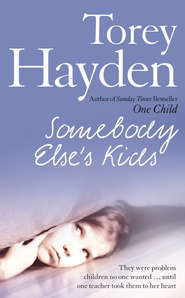По всем вопросам обращайтесь на: info@litportal.ru
(©) 2003-2024.
✖
Silent Boy: He was a frightened boy who refused to speak – until a teacher's love broke through the silence
Настройки чтения
Размер шрифта
Высота строк
Поля
His eyes fell. To the carpet. To the book. To his hands. A great silence loomed up which was both divisive, putting infinity between us, and binding. For a boy who said nothing, he certainly left nothing unsaid.
‘Kevin?’
He gestured. I didn’t understand. He gestured again and grimaced, frustration sharpening the movements of his hands. But I was stupid. Disgruntled, he smacked the floor with his fingers, and we sat again in silence.
‘Can you, Kevin?’
His eyes came back to me, back to meet my eyes. He nodded.
‘You can?’
He shrugged.
‘You can, though. You can talk? You can but you don’t? You won’t? Is it something like that?’
An incomplete gesture with one hand and then he dropped it. He shrugged again and stared only at the carpet.
‘Why don’t you then?’
He began to cry, his mouth dragged down in misery. I thought to put my arms around him and comfort him but I didn’t. I shouldn’t. The silence between us told me that much, so I just sat, my hands in my lap. Kevin only wept harder, his big man-sized fingers locking and unlocking. His shoulders shook. But no sound came from him.
On my way back to the clinic from Garson Gayer, I stopped in town to pick up some labels from the printer’s. As I was walking down the street toward the print shop, I passed a drugstore window filled with an array of Halloween decorations for sale. I had gone completely by the store before being pulled back to pause and gaze at the display. Black cats on pumpkins, honeycomb jack-o’-lanterns, glow-in-the-dark skeletons, ghost lapel pins, a book of Pumpkin carols and other Peanuts memorabilia lined the window.
A profound, aching nostalgia flooded me as I stood there. I no longer had any children to buy decorations for, no longer had a reason to make a room gay with orange and black crepe paper. Suddenly my life seemed so empty, cast adrift as I was in an all-adult world.
I could hear the kids. Standing right there on a city street in front of the drugstore, I could hear things like Robbie Cutmar’s gleeful whoops when I had pulled that big, honeycomb pumpkin out of the bag. It had cost me $3.98 in a year when $3.98 was a lot of money to me but it had been such a glorious thing. We made legends about that pumpkin, about where it had come from, about the mysterious things it must have seen when our dingy little classroom was empty for the night. Halloween came and went and still we couldn’t take that pumpkin down. It’d stayed with us in the classroom until almost April, until Tessa had accidentally fallen on it during a seizure and smashed it flat. And yet, for all its glory, that pumpkin wasn’t nearly so splendid as any of these in this window. That was the problem, I thought sadly. I could now afford to buy whichever pumpkin in the window I wanted but there was no place in my life to put it.
The window display proved too attractive. I had to go inside the drugstore to look at the things more carefully. All the while a black-hearted little gremlin sat somewhere inside me and chided me for the irrationality of what I was doing. After all, I had no class now; I might never have one again. I didn’t have any children of my own. I had no excuse to buy things like this for myself. But at the same time I fingered the change in my pocket, counting how much was there beyond what had to be spent at the printer’s.
I succumbed. I got a little package containing two cardboard bats with honeycomb bodies to be attached. With a piece of thread they could fly. Then I picked up a copy of the Pumpkin Carols. I’d always been an ardent Peanuts fan. One of the greatest pleasures of my career had been the last year I’d taught, when the kids had gone together and bought me a Snoopy wristwatch as an end-of-the-year present.
Paging through the songbook, I giggled aloud. Then I turned it over to see the price. One dollar. A whole crummy dollar for four pages and seven songs. What an awful lot of money for something like that. Especially when I did not need it. I put it back.
Aimlessly I wandered around the store and looked at other things, at birthday cards and ball-point pens. I walked through the aisles of shampoos and cotton balls and nail clippers. But I wasn’t being very successful. I could actually hear the kids singing those stupid little songs. But there aren’t any kids now! Still, I could hear them. And without half trying I could see their faces. Whoever said an active imagination is a blessing?
I returned to the display, lifted the songbook, flipped through the pages again. Then like a shoplifter, I slipped the book under my arm so that I would not have to acknowledge to my black-hearted little gremlin that I was doing such a stupid thing as buying it.
Back in the office I tore open the package with the two cardboard bats and punched them out of the sheet. Laying out the directions in case I got desperate enough to resort to them, I began assembling the things. It was no mean feat. A Ph.D. in engineering would have been the most helpful.
‘What the hell are you doing?’ Jeff stood in the doorway.
Having stacked three of his medical dictionaries on top of my desk, I was standing on them in an attempt to reach the ceiling. We worked in an old building and the ceilings must have been at least eleven feet high.
‘I’m hanging these bats.’
He shut the door and came across to my desk. Skeptically, he gazed up. ‘Escaped from your belfry at last, did they?’
I made a face at him.
‘Where did you get the idea that we needed bats hanging in here?’
Finally I managed to get one thumbtack into the ceiling and then reached up to tie a thread around it. Even with three massive books under me, I was not tall enough.
‘You’re not intending on hanging any of those over my desk, are you, Hayden? They’re not going over there.’
The thread was refusing to cooperate. Once I did get it around, it pulled the thumbtack out of the ceiling when I tried to tie it. That, along with Jeff’s comments, was serving to stretch my vocabulary into a more colorful vein than I normally used.
Jeff’s interest, however, was definitely aroused. He was leaning over my desk and staring up. ‘Why don’t you make a loop first?’ he asked.
‘Why don’t you move off?’
‘I mean, put the tack in, then make a loop and try to lasso it.’
‘Don’t worry about it, Jeff. I’ll manage fine.’
Jeff went over to his desk and picked up his new edition of The Physician’s Desk Reference and brought it back. He nudged my leg. ‘Here, Hayden, move over. Let me do it.’
Within moments we were both balanced on books atop my desk with cardboard bats swinging from our hands.
I liked Jeff. Everyone liked Jeff. There was something about him which was innately likeable, but it was a mercurial, undefinable quality. He was tall but not particularly handsome, at least not in the classic handsome-doctor way. He was more what you’d call cute, like a boy you’d take home to Mother when you were in high school. His hair was brown and wavy, a few freckles were still left on his nose and he had never had his teeth straightened, so when he smiled, it came out a cheerful, lop-sided grin. He had an unsurpassable sense of humor, brash, zany and somewhat more juvenile than one would expect from a doctor. Secretly, I suspected that was the reason Jeff and I had been sequestered off together. Between the two of us, we pretty much comprised the clinic’s contribution toward New Wave psychiatry. But for all his beguiling boyishness, Jeff was brilliant. Of all the people I had met in my career, I don’t think I had ever come across anyone with as much sheer intelligence as Jeff had. It glowed from him. We all knew Jeff was brilliant, including Jeff himself, which made him rather hard to live with sometimes. But he had the golden touch. And while he wasn’t modest about it, he took it casually, as if it were not something special. That made him likeable, that quality of off-handed genius, and it made the rest of us feel lucky to know him.
We were still standing there, nose to nose, atop books on my desk when Kevin weaseled his way back into my conversation.
‘What do you think?’ I asked Jeff, after telling him about the morning’s experience.
Jeff paused, fingering the paper honeycomb of the bat’s belly. ‘What’s he afraid of? Is he afraid of actually talking, do you think? Of hearing his voice?’ Another small pause and Jeff looked at me. ‘Or of what his voice might say, if he does talk?’
‘I don’t know,’ I replied.
‘Or is he maybe not afraid at all of that? Could it be that he doesn’t want to talk and he’s discovered fear makes a convenient cover? People might not bother you quite so much to do something if they think you’re afraid of it. They no longer blame you and make you responsible.’ Jeff then stretched up and tied the thread into place. The bat flew between us.
‘I don’t know. He’s different from my other elective mutes. I don’t know what’s going on with him. I don’t know what he’s thinking.’
Jeff gave me an easy, very casual sort of grin. ‘No. But then do we ever know that?’
Chapter Five (#ulink_1ba9e788-8bc8-566b-85e5-8a0557d89785)
The one other person whose imagination had been captured by Kevin’s enigmatic behavior was the Garson Gayer social worker, Dana Wendolowski. She had been the moving force behind obtaining permission to keep Kevin at the home beyond the usual age limit and she had been the one to go to the trouble of searching for someone with expertise in psychogenic language problems.
I found a friend in Dana. She was an incredibly hard worker. The only social worker for all of Garson Gayer’s ninety – six children, she still managed to keep tabs on the progress of even the most hopeless ones and to do what she could to improve their situations both inside and outside the walls of the home. There never was a child I asked her about whom she did not know personally. And there certainly wasn’t a single one of them she didn’t care for passionately.
Although originally from a close-knit farm family in the distant rural reaches of Tennessee, Dana had been in the city since she had finished her graduate studies in social work. In her late twenties, she was a very attractive woman in a Scandinavian sort of way, although her fine, highborn features were at odds with her gentle personality.
In the past Dana had tried her own hand at working with Kevin and trying to get him to talk. She had repeatedly brought him into her office, tried to put him at ease by not forcing the issue and by being kind and reassuring with him. But she just had too many other obligations, and after a number of weeks of fruitless, one-sided interactions, she had been forced to give in. But she hadn’t given up on him.
I met Dana when I came into the back room behind the office the following morning. She had been retrieving some typing from the secretaries at the front desk and I was headed for the coffeepot to make some milky coffee. The sessions with Kevin were killing my voice, and even though I didn’t really like coffee very much, that seemed to be the only thing between me and hoarseness.
How was it going? she asked. All right? Was the room all right? Did I need anything? Did I have what I wanted in there?











